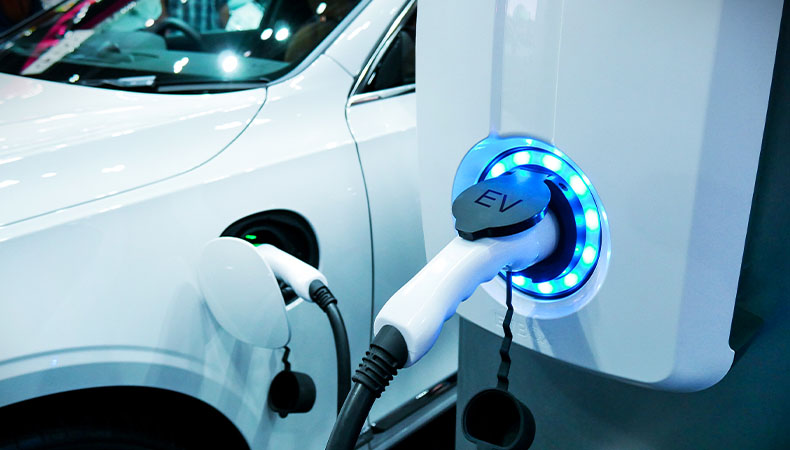Car schemes that support employee financial resilience and inclusivity
Green car benefits have become a prominent part of financial wellbeing programmes, thanks, in a large part, to employer salary sacrifice schemes.
Electric vehicle (EV) take-up in the UK this year has increased significantly, industry data shows that recent growth in the EV market share could not have been achieved without salary sacrifice.
On top of this, 40% of employees say their next car will be electric, according to Tusker’s 2024 Survey.
Cost savings are top of their minds, with 62% planning to drive an EV via their employer’s salary sacrifice scheme to support this.
Not only do these schemes align with corporate sustainability and ESG objectives, they also offer National Insurance savings for the organisation and an affordable way for employees to drive electric.
Not only can people substantially decrease their motoring costs into a manageable monthly sum (with no deposit to pay, or unpredictable running expenses), but with electric cars, employees also save on fuel.
Based on a cost comparison through Zap-Map’s calculator, a Citroen e-C4 and a Citroen C4 travelling 10,000 miles per year with electricity price of 7p/kWh and petrol at 144.9p/litre, savings show as £1248 per year.
Providing a tangible benefit
Offering an EV through a salary sacrifice scheme can become a highly tangible benefit for employees - and one for which they don’t need to find a deposit.
They get to use and enjoy a vehicle of their choice, for an agreement length of their choosing whether it’s for commuting, the school run or going on holiday.
In fact, 93% of respondents to Tusker’s EV Driver Survey Report 2024 said they were either ‘satisfied’ or ‘very satisfied’ with their EV Tusker car, while 97% said their EV was either ‘reliable’ or ‘very reliable’.
Salaries go further
EV car benefit schemes also help employees’ salaries go further because of the salary sacrifice mechanism.
The take-home pay of a basic rate taxpayer earning £500 gross salary for example, would be £360.
But under EV schemes, employees can use the full pre-tax value of that gross salary to benefit from a Tusker car arrangement as a fixed monthly cost.
In other words they’re getting the benefit of £500 worth of benefit (an inclusive car) for a cost to their back pocket £360.The scheme is therefore tax efficient because the salary sacrifice mechanism lowers the tax and NI contributions of both employer and employee.
While the benefit is employee funded, under an EV arrangement, the employer will make Class 1 NI savings which can either be reinvested back into wider employee benefits programmes or ESG initiatives or passed back to the employee.
Monthly budget is set, so no surprises
When it comes to budgeting, unlike self-funding through a personal lease arrangement, car benefit schemes provide an inclusive EV or low-emission car at a fixed monthly cost – and without the need for a deposit.
These schemes offer built-in protection because they cover not only the cost of the car itself but insurance, servicing, maintenance, tyres, RFL and any breakdowns and repairs.
The peace of mind for employees this fixed monthly cost can bring is massive.
Flexibility for changing life circumstances
Under personal lease arrangements, individuals are typically ‘locked in’, so if there’s a need to terminate the contract mid-term, there will often be a significant financial penalty.
This isn’t the case with EV car schemes.
Life changes such as redundancy or long-term illness, can have massive financial implications, so built-in lifestyle protections ensure that in most cases, the car can be returned without any financial penalties.
Better value than personal lease schemes
Employees can also benefit from manufacturer discounts, if the provider’s relationship facilitates this.
In addition, depreciation value ceases to be an issue.
With the EV market moving at significant pace, the residual value of an EV can decline in just a few years.
Yet under salary sacrifice schemes, it won’t matter if the car’s residual value has dropped – the employee can hand the car back and walk away.
Supports employees who need it most
While it’s important that employees are able to enjoy cars which are both affordable and tax-efficient, it’s also important to support lower-paid employees. For the 20% taxpayer, purchasing a car could wipe out any savings, whilst rising insurance premiums could throw a sudden curve ball to their finances.
Longer-term plans ensure these employees can take advantage of EV schemes in an affordable and managed way: preloved cars have typically lower price points and the longer-term duration keeps monthly costs as low as possible.
Affordability checks are also carried out to ensure employees see cars that are affordable to them, and which won’t take them below national living wage.
Ultimately, EV car schemes provide huge financial benefits.
For the employer, EV car schemes meet sustainability and ESG objectives while adding value to remuneration offerings.
For the employees, these schemes open up the EV market in affordable, tax-efficient ways enabling employees to take a first step into the next generation of car without the worry of unpredictable running costs or depreciation.
For employers wanting to support the financial wellbeing of their workforce, these schemes go a long way.
Supplied by REBA Associate Member, Tusker
Tusker is the UK’s leader in salary sacrifice cars. Part of Lloyds Banking Group, it has more than 15 years’ experience in offering an affordable way for employees to drive a new, fully insured, and maintained car. Its scheme, which is available to over 1.8 million UK employees, offers a range of options, from pure electric cars to hybrids and even traditional petrol and diesel vehicles. It provides a tailored scheme for organisations’ individual needs.








